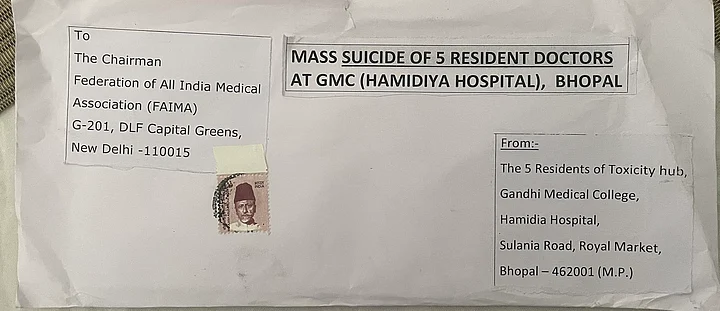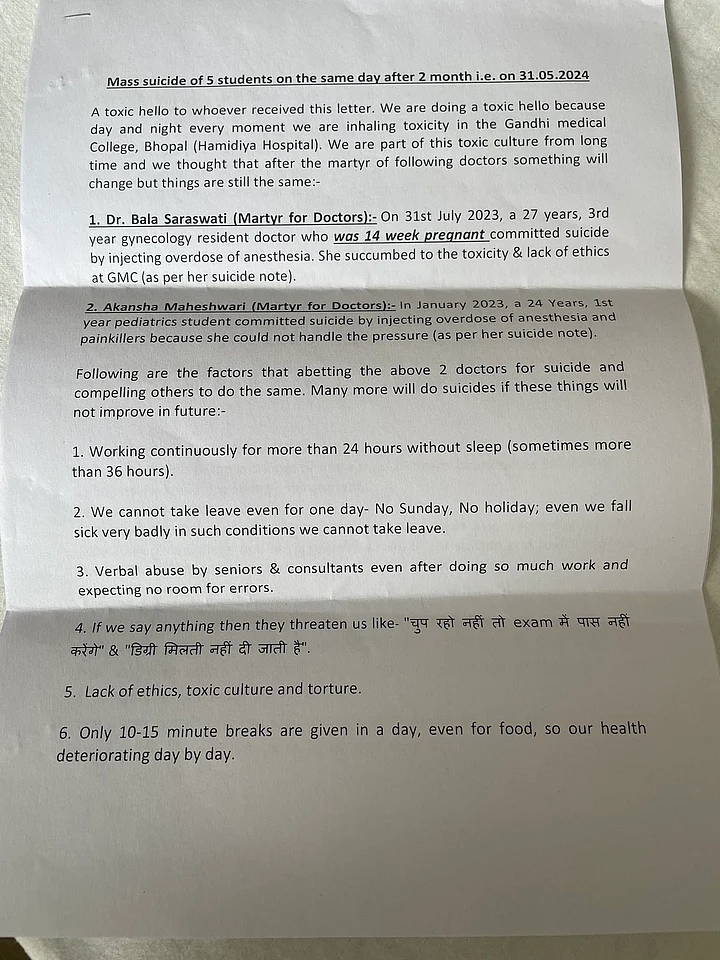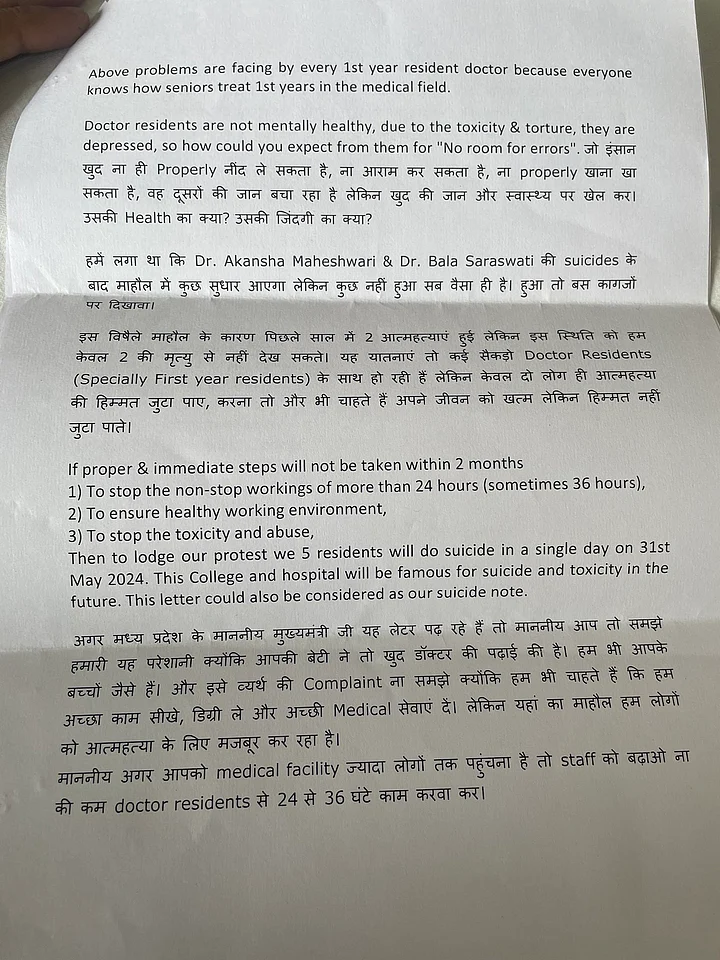"This could also be considered as our suicide note," reads an anonymous letter purportedly written by five resident doctors at Bhopal's Gandhi Medical College (GMC) who have threatened to die by 'mass suicide' on 31 May if measures are not taken to change the 'toxic work culture' at the said hospital.
The letter, which is addressed to the Federation of All India Medical Association (FAIMA), describes the hospital as 'toxicity hub'.
It alleges that the resident doctors, especially those in their first year of residency, are:
made to work continuously for 24-36 hours
not given weekly leaves, public holiday leaves, or even sick leaves
subjected to verbal abuse by seniors
In response, FAIMA wrote to Dean of GMC to pay "urgent attention" to the letter.
‘No Leaves, Verbal Abuse’: What the Letter Said
Making a case for a “lack of ethics, toxic culture, and torture for a long time", the letter states that at least two resident doctors had been “martyred” in the hospital in 2023.
In January 2023, Dr Akansha Maheshwari, 24, a first-year paediatrics resident, had died by suicide as she allegedly “could not handle the pressure.”
In July the same year, Dr Bala Saraswathi, 27, a third-year gynaecology resident, had allegedly died by suicide. In her suicide note, the 14-week-pregnant doctor had alleged that she faced “harassment by the college faculty.”
Dr Sanket Site, Madhya Pradesh president of Junior Doctors’ Association and a third-year resident at GMC Bhopal, told FIT, “As soon as I saw the letter on Monday (15 April), I went to the Dean and an HoD-level meeting was immediately conducted with all the departments.”
“We are taking the letter very seriously. We are monitoring the situation and taking necessary steps to help the resident doctors. Since the letter is anonymous, we initially tried asking the residents about their concerns. So far, no one has said that they are facing any problems. We have told them that they can approach us, and we’ll maintain their anonymity. Now, we are planning to talk to each and every resident from all departments. We will also ask students to let us know if any of their friends are facing any stress or anything untoward.”Dr Sanket Site
Dr Mahendra Pratap, a first-year anaesthesia resident at the hospital, too, said, “The dean asked all the resident doctors to sit, talk, and address issues with him after the letter went viral.”
FIT also reached out to the GMC’s Dean Dr Salil Bhargava. The story will be updated when he responds.
FAIMA, to whom the letter was addressed, also wrote to Dr Bhargava on 16 April, saying:
“We also request you to kindly investigate the concern mentioned in the letter related to work culture, duty hours of the resident doctors. As there has been previous history of suicides in college, we humbly request you to take this letter on a serious concern which requires your urgent attention [sic].”
‘Doctors Overworked, on the Receiving End of Angry Reactions’: The Situation on Ground
Dr Pratap tells FIT, “There are some departments which are dramatically overworked since the patient inflow is very high. These include obstetrics and gynaecology, surgery, medicine, and orthopaedics. This is because they also have to look after the ward, the OPD, while also handling other shifts.”
Dr Site added that the patient-to-doctor ratio in government hospitals across the country is generally poor.
“Every month, at least 5-6 times, first year residents have to do night shifts or emergency shifts that extend beyond 24 hours and could go up to 30-36 hours.”Dr Sanket Site
For leaves, however, Dr Pratap mentioned that if there are multiple people applying for a leave in the same unit, it might not be approved.
Meanwhile, while Dr Pratap conceded that “resident doctors do not have the scope of making a mistake since they’re handling life and death,” he added that, “some doctors say some things when they’re angry, frustrated, or under tremendous work pressure.”
Dr Akash Soni, former Madhya Pradesh president of Junior Doctors’ Association, agreed with Dr Pratap. He alleged that he too had seen seniors curse at junior doctors.
However, both were quick to add that this was “not a norm” in the hospital.
On the other hand, Dr Site dismissed other concerns raised in the letter.
“The letter exaggerates the situation. It was very surprising. I think it’s the first time that someone has threatened mass suicide. We have to be professional in dealing with residents so that there’s no complaint of discrimination.”Dr Sanket Site
‘Implement the Rules’: Doctors Demand Reforms
After Dr Saraswathi’s death by suicide last year, junior doctors at the GMC had organised a strike and demanded reform in the hospital.
The Head of Department of Obstetrics and Gynaecology, Dr Aruna Kumar, was transferred out of the college. At least five other faculty members were served notices and summoned by the police.
Other disciplinary rules were brought about in the hospital too. A suggestions box and a complaints box were set up. The doctors’ roster was modified.
In January this year, the National Medical Commission (NMC) also notified the new Post-Graduate Medical Education Regulations which mandated that resident doctors should work for “reasonable hours” and be given “reasonable time” to rest.
The new regulations allowed resident doctors 20 casual leaves and five academic leaves each year.
But most of the reforms are just on paper, the doctors alleged. Dr Pratap told FIT that smaller issues often compound and add to the stress that junior doctors face.
“Implementation is the problem. It would significantly help if the rules were followed.”Dr Mahendra Pratap
Dr Soni conceded. He suggested that counselling be given to residents and MBBS students to "mentally prepare them for residency."
He also suggested that the government give a six-month probation to resident doctors, under which they have the option to quit residency without having to pay the penalty fee or bond amount for that.
This “seat-leaving bond” and retention policy is something that the NMC has already written to states about earlier this year.
Dr Pratap, on the other hand, added that improving the inflow of medical supplies (like gloves, medicines, etc) to the hospital will help. "These do not reach the hospital regularly and the junior doctors have to run around to arrange the supplies, adding to their stress," he said.




